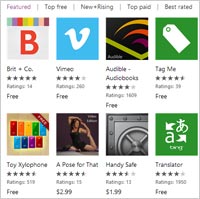 Windows Phones may not be selling quite the way Microsoft had hoped, but they have a pretty storefront on deck just waiting for customers. According to ABI Research’s
competitive evaluation of the major smartphone platforms and their respective app stores, the Windows Phone 8 publisher and perennial mobile also-ran Microsoft is the most innovative app sales
platform among the big three.
Windows Phones may not be selling quite the way Microsoft had hoped, but they have a pretty storefront on deck just waiting for customers. According to ABI Research’s
competitive evaluation of the major smartphone platforms and their respective app stores, the Windows Phone 8 publisher and perennial mobile also-ran Microsoft is the most innovative app sales
platform among the big three.
Discovery is the name of the next part of the app merchandising game, and Microsoft’s algorithms are simply more nuanced than Apple's in determining
leaderboards. According to Senior Analyst Aapo Markkanen, Microsoft has moved beyond measuring download counts and folds in consideration of quality based on other criteria like retention of apps and
customer satisfaction. "Although Apple has done a great job capitalizing on App Store’s head start as an app distributor, it should really start rethinking the way it charts the top apps."
advertisement
advertisement
Markkanen says that Microsoft's approach ultimately is better for app developers because it enhances discovery, allows for greater transparency and will “help break the developers free from
the "tyranny of downloads'." They should be able to leverage the quality and usability of their apps to gain visibility, not just ladder-climbing driven by costly marketing campaigns.
Markkanen tells me that Microsoft has been more forthcoming than the other stores in speaking openly about how it is arranging its stores. A blog post from Microsoft provides some details: Markkanen says: "Thus far
I haven’t heard anything official from Apple or Google on this front, so we pretty much rely on what developers and publishers, or vendors serving them, are observing. That’s a big
contrast to the attitude that Microsoft is now displaying."
Well, I am not so sure Microsoft has the App Store usability thing down yet. I have to say that after playing around with Windows
Phone 8 a while I just can’t always tell easily when I swipe laterally or vertically, let alone how subtopics are nested in the information architecture. It actually took a few tries in the App
Store to get beyond Apps and Games into the actual subcategories of apps. They also have a weird recommendation engine at work in here. Whenever I asked for a "suggestion" for an app, it only served
me one -- Bing!
Personally, I think it is high time one of these big three got a little more serious about getting app stores to 2.0. We need more embedded personalization that informs app
searches and even default storefront pages. And everyone needs to make these app stores more lively and enjoyable experiences that invite the user to visit frequently.
Icons are not
merchandising. Content is merchandising. Two storefronts already on multiple platforms actually do this better than the OS makers themselves. Comixology’s digital comics market is alive with
daily refreshes and themed deals, often well-tuned to current events and other media. Digital magazine platform Zinio actually pulls enticing articles from the library of digital editions to pull
people into the experience and showing, not telling.
There has to be a better way than shuffling around walls of icons and calling it a store.